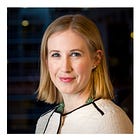This article is part of Fintech Leaders, a newsletter with almost 70,000 builders, entrepreneurs, investors, regulators, and students of financial services. I invite you to share and sign up! Also, if you enjoy this conversation, please consider leaving a review on Apple Podcasts or Spotify so more people can learn about us.
I travel to Alexandria, Virginia for an in-person interview with a fintech legend - Nigel Morris, Co-Founder of QED and Capital One.
QED is a global fintech venture capital firm that has backed numerous amazing companies, including Credit Karma, Nubank, Mission Lane, Avant, SoFi, and Klarna. They currently have over $4.0 billion in AUM.
Prior to QED, Nigel co-founded Capital One in 1994. The bank today is amongst the 10 largest banks in the US with almost $500 billion in assets. They are also one of the most innovative financial institutions that have inspired countless of entrepreneurs worldwide.
In this episode, we discuss:
Building Capital One and the principles and innovations that shaped the success of the bank
“I jokingly say that in those days, I didn't know the difference between a letter of credit and a line of credit, and I used to get assets and liabilities mixed up. And I still do.”
A Fanatical Focus on Unit Economics and Scientific Methodology Transformed Capital One into a Data-Driven Powerhouse.
Nigel Morris attributes Capital One's success to an unwavering emphasis on unit economics and a scientific approach to business decisions from day one. Drawing from actuarial analysis and his consulting background, Morris emphasized calculating the net present value per customer—a more precise metric than conventional ratios like LTV to CAC. This focus allowed the bank to evaluate ideas based on their real economic value at a unit level. Additionally, the company embraced a rigorous hypothesis-driven methodology in Karl Popper style, aiming to disprove assumptions rather than merely seeking confirmation. This approach led to groundbreaking practices like risk-based pricing, teaser rates, and opening credit access to near-prime and subprime customers. By conducting thousands of real-time A/B tests, Capital One operated as a "giant experimental laboratory," constantly refining its strategies based on data-driven insights.
Intentional Culture as the Secret Sauce Behind Capital One's Success
Beyond analytics and strategy, company culture was crucial in building Capital One with a strong foundation. Nigel reminds us that culture doesn't just happen; it must be intentionally crafted and embodied by leadership every single day. Clearly defining what the company culture is and isn't becomes terribly important, and leaders must provide tangible examples to bring it to life. This intentionality can prevent dissonance within the organization, so the culture scales effectively as the company grows. As many of us know, the culture of an organization is a direct projection of its founders, which places significant responsibility on leaders to always embody these values. Companies that truly focus on culture, Nigel says, is what truly differentiates amazing companies.
Nigel started investing in venture capital 17 years ago – what has he learned about backing great founders?
“I still think like and act like an operator, and I just sometimes, if you show me a transcript of a board meeting, I can tell you where people are in the cap table.”
Tenacity and Resilience Are Far More Important Than Pure Brilliance in Founders
While intelligence and a passion for making a difference are important, the true hallmark of a great founder is tenacity. Nigel is looking for entrepreneurs who can confront failure head-on, think strategically about setbacks, and have the grit to try again. Over the years, he’s observed many high-achieving individuals who've sailed through elite schools and careers without really experiencing failure – they don’t really tend to make great founders. Instead, he values those with an "energizer bunny" spirit who can power through challenges and possess an innate drive to reach the next level despite obstacles.
He also believes in founders who are self-aware enough to recognize their strengths and build teams that complement their skills. He finds powerful synergy in co-founding arrangements where one person is strategic, extroverted, and passionate about solving problems, while the other is technical and analytical, building the capabilities behind the vision. This combination creates a "gestalt of capability" greater than the sum of its parts. Finally, Nigel looks for founders who are open to learning from experienced investors like QED. Rather than just seeking funds, ideal founders value the hands-on partnership and are eager to absorb insights from past successes and failures to enhance their own journey.
Why Nigel is still very bullish about the future of fintech
“When we invested in Nubank or seven, eight years ago, we didn't fully internalize how big an opportunity Brazil would be, and then coming out of Brazil, how big an opportunity Mexico would be.”
Nigel Morris remains highly bullish about the future of fintech, an industry he reminds us is still in its early stages. Despite the global financial services sector being a $14 trillion market, fintechs account for just 2-3% of revenues—meaning 97% of financial service revenues are still untouched by fintech firms. He believes we're only in "chapter two" of this revolution, with enormous opportunities ahead. Perhaps some of the biggest opportunities and potential will come from developing markets like Brazil, Mexico, India, Nigeria, and the Middle East. These regions offer progressive regulatory climates focused on inclusion, allowing fintech companies to reach underserved populations, provide them with essential financial products, and drive significant growth for the companies.
What makes an effective board meeting
“I have a two-by-two box that I ask the CEOs of my portfolio companies… it’s a one-pager that says: (1) what's going really well, (2) what's not going well, (3) what's keeping you up at night, which might be different to what's not going well, and (4) What decisions do we have to make today.”
Proactive Preparation and Clear Communication Elevate Board Meetings
Effective board meetings hinge on meticulous preparation and transparent communication from CEOs. Nigel advocates for a concise one-page summary outlining what's going well, what's not going well, what's keeping the CEO up at night—which might differ from immediate problems—and what critical decisions need to be made. The result of this simple 2x2, can not only demonstrate the CEO's command over their business, but also sets the agenda for discussion. It’s also important for company leaders to engage board members individually before meetings to discuss potentially controversial topics – the more surprises you can reduce, the more constructive conversation you’ll have during the actual meeting. Nigel also warns that as companies mature and get bigger, board meetings can often devolve into mere formalities, becoming box-ticking exercises rather than strategic discussions. This is dangerous and management should not avoid key issues to simply keep the board "out of the way,". Once this happens, it can lead to ineffective governance and bad consequences.
A day in the life of Nigel… and a lot more!
“If you've got 150 active companies, every day, one of them will have a crisis, and every day, one of them will have a huge opportunity, and being called into that really suits the sort of ADD that's in my nature.”
Nigel Morris's day is anything but predictable. As the Managing Partner of QED, a fund with 150+ active companies, he shares that "the way it starts is not how it ends." Each day brings new crises and opportunities for portfolio companies—some companies soar like "rocket ships," while others plunge into "the dungeons" overnight. This volatility requires a readiness from investors to dive into issues as they arise. He shares that he thrives in this unstructured environment. His schedule is filled with sharp, energy-infused meetings, board sessions, and nurturing the QED ecosystem. He shares that the intensity and unpredictability of VC, far outpaces his life as a public company leader back in his Capital One days, which fuels his passion for the industry.
Despite a demanding schedule, Nigel is an avid cycler and is deeply committed to his personal health. For the last seven years, he has climbed over a million feet a year in cycling. Most of the time, he utilizes a stationary bike with simulations to conquer virtual climbs like Alpe d'Huez and Mont Ventoux for at least an hour daily, pushing 250 watts at a 7% slope to reach over 3,000 feet each day. This regimen allows him to maintain his physical fitness and "keep up with people of your age." The man is made of steel!
Books Discussed:
"Breaking Up the Bank" by Lowell Bryant - A McKinsey partner who analyzed the constituent parts of banking businesses and where shareholder value was being created.
Works by Sigmund Freud and Carl Jung - Nigel mentions studying these philosophers and psychologists during his teenage years when he was considering a career in clinical psychology.
Works by B.F. Skinner and Edward Thorndike - Nigel discusses being influenced by these researchers and their empirical approach, which led him to reject some of the theories he was learning in psychology.
Want more podcast episodes? Join me and follow Fintech Leaders today on Apple, Spotify, or your favorite podcast app for weekly conversations with today’s global leaders that will dominate the 21st century in fintech, business, and beyond.


























Share this post